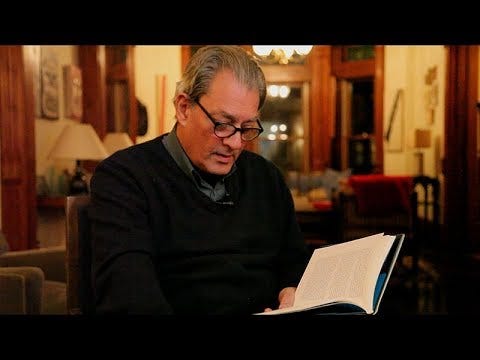Novelist, screenwriter, and filmmaker Paul Auster passed away earlier this year in April 2024. I wasn’t familiar with his work before reading a New York Times obituary. I haven’t had a chance to read his books but something tells me I will enjoy them. Recently I saw an interview with Auster which really resonated as I’m currently working on my own fiction project.
I enjoy listening to how different writers, filmmakers, musicians and artists work on their projects. Rarely are two person’s processes the same and hearing people talk about how they write opens up new pathways in my brain, or prompt me to try something new, to find out my own process.
In this interview with Louisiana Channel, Auster speaks on how he started writing, his process, how language is like music and his thoughts on the role of an artist.
Why Write?: Auster reflects on how he became a writer, including a story about baseball hall-of-famer Willie Mays. When he was 8 years old, Auster asked Mays for an autograph but he didn’t have a pencil or pen, so Mays wasn’t able to sign anything. Afterwards, Auster always carried a pencil or pen around with him after that which is how he became a writer. 52 years later, Willie Mays gave him an autographed ball after reading Auster’s story, coming full circle. ‘Sometimes stories have happy endings.’
On storytelling: ‘Stories happen to to the people who are able tell to them. Keep your eyes open and you may see something strange or interestingThe job of a writer is to notice things. ‘
Practice: Auster estimates he wrote 1000-1500 pages of unfinished novels - his ‘apprenticeship’, his 10,000 hours. Some of that writing made its way into other pieces over the years but most of it remains unpublished.
Writing process: ‘A good day’s work is one typed page. Two pages is great, three is a miracle.’ Auster is a slow writer, working paragraph by paragraph (the ‘unit of composition in prose’) and has a lot of false starts in the morning but always ends a paragraph before stopping for the day. Auster rewrites a passage 10 or 15 times, fixing the sentences over and over, aiming to perfect it before moving on. He calls this process ‘raking the leaves, going back over what he’s written, rereading it, perfecting it, until he ‘gets all the leaves off the lawn, until it looks perfect.’ He wants to hear the rhythm of the words until it’s ‘like music, effortless and smooth’, with the energy he’s looking for. Auster also moves around a lot while writing which generates thoughts and words. ‘The music inside the body is language.’
Write ‘swift and lean’. Books that have holes, spaces - gives the reader a breather, and thereby reader becomes an active participant. Some writers overwrite, especially while describing things. ‘Take out as much as you can, propel yourself forward’. Each word counts. Engage your reading with every word.
Read carefully. Auster says people who read novels like newspapers, for the story or the information, are not really listening to the sentences. A book’s style is like music, it has tone and rhythm, which also carries meaning. ‘If you’re attuned to it, you’ll get more out of it.’
Engage deeply with your material. ‘The essence of being an artist is to confront the thing you’re trying to do, to tackle it head on and if while wrestling with these things you managed to make something good, it will have its own beauty but it’ll be a beauty you can’t predict. All you can do is strive to engage with your material as deeply as you can, even if you’re trying to be funny. ‘
Give it everything you’ve got. Auster says you can’t be a writer, painter, musician unless you try as hard as you can, even if all you did that day was cross out sentences and throw paper in the trash, at the end of the day you gave it everything you had.
I’m really looking forward to reading Auster’s work and seeing how he employed these tips in his writing. In the interview, he shares a glimpse inside his handwritten manuscripts which are, curiously, on graphed paper. I love his analogy of ‘raking the leaves’, going over and over what you’ve written and slowly perfecting it until it sounds right. Auster also compares writing to music and I wonder if he’s also a musician. This is an important reminder for my own writing, that I should keep in mind the rhythm, pace, and tone of the words I’m using, adding meaning to a piece of writing, how that can be its own music.
Until next time,
Keith




